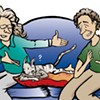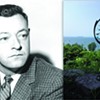Published June 19, 2002 at 4:00 a.m.
The Green Mountains are full of high-profile writers. But only one has inspired a hunger striker, a congressional denunciation and references to Hitler with a single book. Judith Levine, a part-time resident of Hardwick, has been all over the national media since the March publication of her Harmful to Minors: The Perils of Protecting Children from Sex. The 49-year-old journalist has aroused the ire of conservative critics — including Republican Congressman Tom DeLay and talk-show host Dr. Laura Schlessinger — by calling for greater sexual self-determination among teens. Her book argues that parental “hysteria” about pedophilia, child pornography and Internet predation is fueling a dangerous trend that denies teens comprehensive sex education and their rightful “entitlement to pleasure.”
“Teens often seek out sex with older people,” Levine writes, “and they do so for understandable reasons: an older person makes them feel sexy and grown up, protected and special; often the sex is better than it would be with a peer who has as little skill as they do. For some teens, a romance with an older person can feel more like salvation than victimization.” On the subject of child pornography, she criticizes prevention laws that “have diverted millions of dollars from real child welfare and created an atmosphere of puritanical surveillance over all U.S. citizens in the dubious name of catching a small number of people who, if left alone, might do nothing more harmful to minors than sit around and masturbate to pictures of ten-year-olds in bathing suits.”
Levine figured her book would be controversial. In its pages, she attacks censorious feminists along with right-wing politicians for their contributions to what she calls “the sexual politics of fear.” Therapists, too, play a part in the pathologizing. Not surprisingly, the book was rejected by numerous publishers before the University of Minnesota Press signed on — one editorial board called the footnote-filled manuscript “radioactive.” But there was no way to predict the coincidence of its publication with a global scandal over sexual abuse of children by Roman Catholic priests. “I actually thought the book — like most books — wouldn’t make it above the radar,” she says.
In fact, Harmful to Minors triggered a full-frontal national assault on Levine and her academic publisher, which didn’t print enough books to meet the demand generated by the early publicity. Conservatives were appalled that she would suggest lowering the age of consent in recognition that sex between minors and adults may be “unproblematic.” The first damning headline read “Minnesota Press Publishes Book Challenging the Demonization of Pedophilia.” Under pressure from the state legislature — specifically, Republican Majority Leader Tom Pawlenty — the University of Minnesota agreed to undergo a two-month review of how it acquires books.
By mid-April, the firestorm had spread to Washington, D.C., where Rep. DeLay issued a statement denouncing former U.S. Surgeon General Joycelyn Elders. Her comments on masturbation, for which she was sacked during the Clinton administration, qualified her to write the forward to Harmful to Minors. “Through her endorsement of this book, Joycelyn Elders is perpetuating the damaging effects of inappropriate sexual relationships between adults and children,” DeLay accused.
Pretty soon, critics were calling Levine’s work a “child molester’s manifesto,” and conservative Web sites and talk-show hosts across the country were targeting Levine as a “pedophile” and worse. Vermont psychologist Sharon Lamb heard the first jab on “Dr. Laura.” “I think she was saying that Judith had said it was okay for a teen-ager to have sex with a priest,” recalls the author of The Secret Life of Girls. “I knew that wasn’t what Judith said.”
Not surprisingly, most of Levine’s critics haven’t read her book, which is exhaustively researched and substantiated. Long-time anti-porn activist Judith Reisman told The New York Times: “It doesn’t take a great deal to understand the position of the writer. I didn’t read Mein Kampf for many years, but I knew the position of the author.”
Levine told the Times, “The reaction to the book is an example of the kind of hysteria I am talking about.”
In dozens of interviews on radio and television over the past three months, Levine has definitely sharpened her sound bite. Here’s a good one: “If I wanted to design a large, long-term study to prove the point of my book, it would be the Catholic Church — a culture in which there is a rigid enforcement of secrecy and ignorance about sexuality that demands absolute obedience to authority by children. You get adults in perverse situations and kids in danger.”
Levine is an energetic defender of sexual civil liberties, whether she is battling Fox’s Greta Van Susteren or chatting in the car en route to Hardwick from the Burlington International Airport. Her first media encounters were upsetting. “I felt like my reputation was really in danger, that my work was trivialized, and it was,” she says. But positive reviews in The Nation, Boston Phoenix and In These Times suggest the tide may be turning. Numerous publishers have shown interest in acquiring the paperback rights for the book.
Levine has flown in on Jet Blue from Brooklyn to spend the weekend with her long-time boyfriend — they’ve maintained separate residences for 10 years, but Levine shrugs off a question about eventual cohabitation. She’s dressed the part of left libertarian feminist contrarian socialist — in heavy black glasses, funky patterned pants, denim and bowling shoes. Despite her awesome powers of analysis, this childless middle-aged woman is convincing when she claims to remember what it was like to be a kid.
“I remember how compelling sex was,” she says. “It seemed to be the place to experience the most intense feelings, both physical and emotional. Some of them were horrible, but I wouldn’t have it any other way. That’s what it is to be a teen-ager — to be embroiled 100 percent of the time in these very intense feelings. Whatever they are, you feel humiliated, or you feel entranced, or you feel elated, or you feel stupid or you feel awkward. Whatever it is, you feel it a lot.”
The conflict between parental protectionism and teen sexual autonomy is at the heart of Harmful to Minors. From the first page, Levine takes the side of youth. “Children don’t want to know about their parents’ sex lives, and from the moment they might conceivably have a sex life, they usually don’t want Mom and Dad to know about theirs,” she writes. “This is why sex education was invented a hundred years ago.”
Even sexually “progressive” parents often have trouble broaching the subject. Levine’s Long Island activist family was definitely cool — they went to ban-the-bomb protests together. Yet when her mother, an administrator of a birth control clinic, offered to get her daughter fitted for a diaphragm, Levine “instructed her in full-decibel fury to mind her own bleeping business.” Her father, a history teacher turned school psychologist, got a similar reaction when he delivered a lecture about the dangers of casual sex. An older brother didn’t have much in the way of useful advice, either.
Levine says she learned to kiss by watching films. Sex ed was “a movie that told us we could play tennis during our periods, in white clothes.” A babysitting gig exposed her to harder-core images in Playboy and Penthouse. But neither pornography nor the standard-issue sex ed in public school explained anything about the mechanics of the act. At 16, during the height of the sexual revolution, she looked into the matter a little more closely. Levine recalls, “I didn’t learn about my clitoris until I read Our Bodies, Our Selves.”
By that time, someone else had found it, too — a 19-year-old boy Levine was convinced had invented cunnilingus. “I thought he was a genius. Like, how could I break up with this boy? I’ll never get this again,” she recalls, laughing.
Her parents didn’t have a clue about the relationship. But if they had, they could have charged the young man with statutory rape — a subject Levine covers in her book. She notes that parents can, effectively, “put their daughter’s boyfriend behind bars,” even if the girl staunchly opposes it. Levine supports a Dutch law which allows children between 12 and 16 to willingly enter into consensual sexual relationships with people of any age. If they feel abused by an elder lover, either the minor or her parents can press charges.
“Statutory rape is not about sex the victim says she did not want. It is about sex she did want but which adults believe she only thought she wanted because she wasn’t old enough to know she did not want it,” Levine writes. “The law encodes an enduring sexist idea — that in sexual relations there is only one desiring partner, the man.”
That’s not why Levine left her own folks out of the loop, though. “Sex is a way of moving away from your family,” she says. “It’s a way to start to find yourself as an adult.” And that discovery doesn’t necessarily end. Levine’s 83-year-old mother has been reading, and loving, Harmful to Minors. The elder Levine has a new boyfriend — her husband suffers from Alzheimer’s — “so she’s into pleasure just at the moment,” her daughter reports, sounding somewhat disapproving.
Levine went to Clark University in Massachusetts, where a female professor turned her on to Virginia Woolf and got her writing poetry. She finished at City College of New York with a degree in English and creative writing. At the same time, she was the volunteer poetry editor for Liberation magazine — an “underground” alternative paper started by anti-Bolshevik pacifists like Dave Dellinger.
That led her through a slew of jobs — bike messenger, waitress, offset stripper for a print shop — to the Columbia School of Journalism, where she earned a master’s degree with a thesis about bureaucratic violence against women in the welfare system. Post-graduation, she turned to freelancing. “I liked to write and I wanted to be engaged politically. You could do that in the early ’80s. You could be a feminist and write for Mademoiselle.”
And in Levine’s case, also participate in a guerrilla theater group. In 1979, Levine helped found No More Nice Girls, a group of feminists reclaiming choice as the cornerstone of women’s sexual freedom. “We put sexuality back into the abortion debate,” Levine says. “We would do this ‘action’ where we were all pregnant, gagged and in chains and stuff.”
In 1992, she wrote her first book, an exploration of man-hating called My Enemy, My Love: Women, Men and the Dilemmas of Gender. But a book about the social constructs of gender and how they contribute to antagonisms between the sexes was tame compared to Harmful to Minors. Nor did it sell as well. “Both books are about something that’s ubiquitous but that nobody talks about,” says Levine. “Both have a utopian germ — the belief that we could actually be free and equal regardless of age or gender.”
Some critics have faulted Levine for ignoring the “dark side of sex” in Harmful to Minors. Although she does acknowledge AIDS and other sexually transmitted diseases — and promotes safe sex throughout the book — she concedes, “I felt like accentuating the positive had a kind of political utility as a counterweight to this notion that it’s all about danger.”
In that spirit, she draws on a wealth of stories and studies, some of which are based in Vermont, to shoot down a multitude of mounting fears: child abduction, molestation and murder by strangers is not on the rise; only 1 percent of the population is predisposed to pedophilia and is mostly satisfied with exhibitionism and voyeurism; child sex offenders can control their impulses, as evidenced by a very low rate of recidivism; online predation has not resulted in any actual known assaults. Though one-third of sexually molested children go on to be abusers, the other two-thirds don’t.
Levine devotes an entire chapter to abuse-obsessed “therapy” and the social-working bureaucracy that has built up around it. She follows the story of a San Diego boy who molested his sister. Due to a series of missteps by overzealous psychologists, both children ended up in foster care. Liberals will cringe reading how the mother spent more than two years and $30,000 to put her family back together again. Social workers later determined the sister had trouble differentiating “between imagination and reality.”
“It’s always easy to make zero-tolerance arguments. It’s much harder to provoke or encourage people to look at exceptions,” says Lamb, who acknowledges Harmful to Minors is a brave and influential book. Although she doesn’t think it will succeed in changing either the law or sex-ed curricula, she offers, “Sometimes somebody has to be out a little further to the left than most people are willing to go for us all to move a little forward.”
Levine is at home in that radical role, even if it is not always comfortable. On one talk radio show, whose producer misrepresented the host as an “NPR-type,” she was subjected to a line of questioning that went something like this: So, are you a mother? No, I have a niece and nephew. Do you ever touch your niece and nephew? Of course I touch my niece and nephew. How do you touch them? At what age would you touch them to initiate them into sex?
“If it had been now, I would have had my wits about me,” Levine says. “But I was speechless. I said, ‘Never never,’ which is like, ‘I’m not a crook.’ It was the second night of Passover. I called my publicist and said, ‘Katy, next producer who calls, tell them that it’s Passover and Judith is busy, out eating Christian children.’”
Levine identifies with Alfred Kinsey, the pioneering sex researcher whose 50-year-old findings are still among the most comprehensive in circulation today. When he reported that 10 percent of the population is mostly homosexual and virtually everybody masturbates, he was accused of “normalizing” those behaviors, even promoting them. “His data was taken to have some kind of moral freight,” Levine observes.
Challenging socially correct assumptions, Levine finds herself caught up in a similar syndrome. In Harmful to Minors, she says what no one else dares to suggest about a topic that makes Americans excruciatingly uncomfortable. In her next book, about her father, she plans to take on the Alzheimer’s industry. “Any disease that afflicts 40 percent of people over 80 years old is not a ‘disease,’” she asserts.
If that sounds contrary, Levine qualifies, “I’m not against everything. I think I have pretty consistent politics. I believe there is an important role for government, particularly in economic policy. But I am suspicious of social laws that protect people from themselves. I think that personal freedom and freedom of thought are worth fighting for.
More By This Author
Comments
Comments are closed.
From 2014-2020, Seven Days allowed readers to comment on all stories posted on our website. While we've appreciated the suggestions and insights, right now Seven Days is prioritizing our core mission — producing high-quality, responsible local journalism — over moderating online debates between readers.
To criticize, correct or praise our reporting, please send us a letter to the editor or send us a tip. We’ll check it out and report the results.
Online comments may return when we have better tech tools for managing them. Thanks for reading.














































